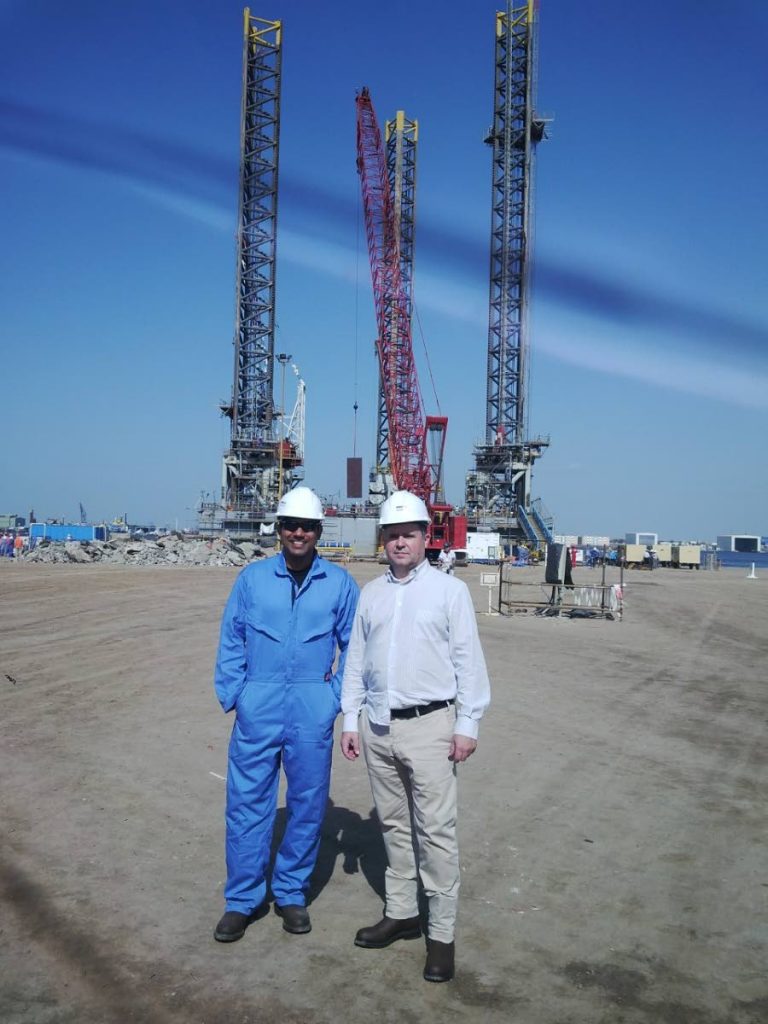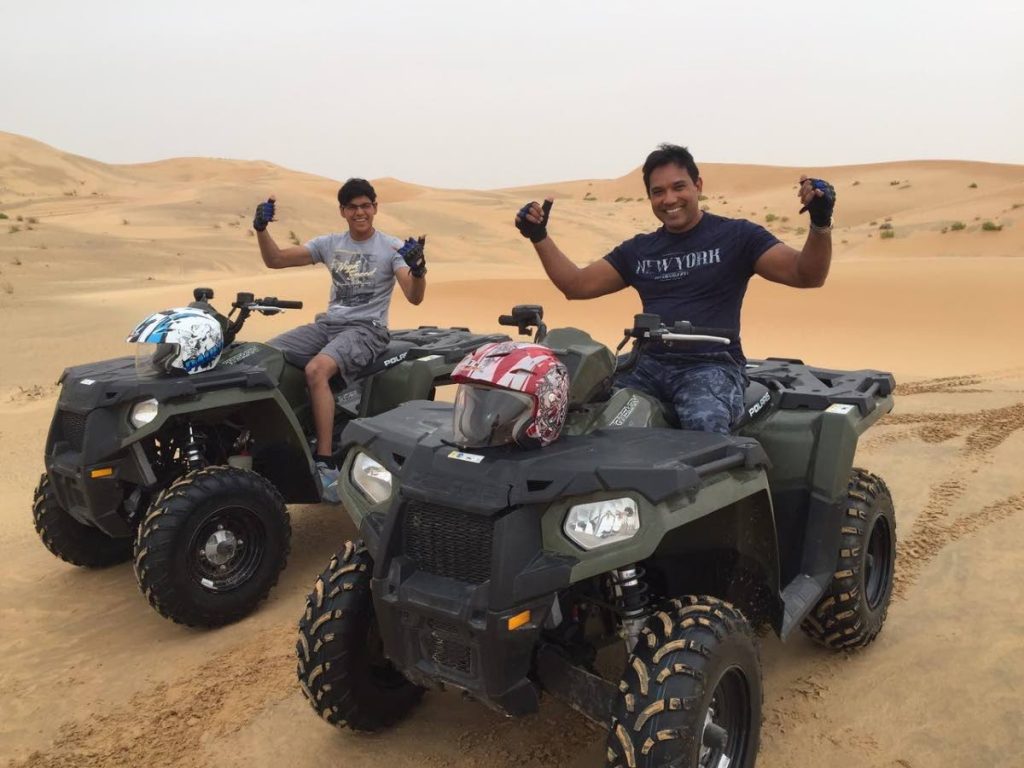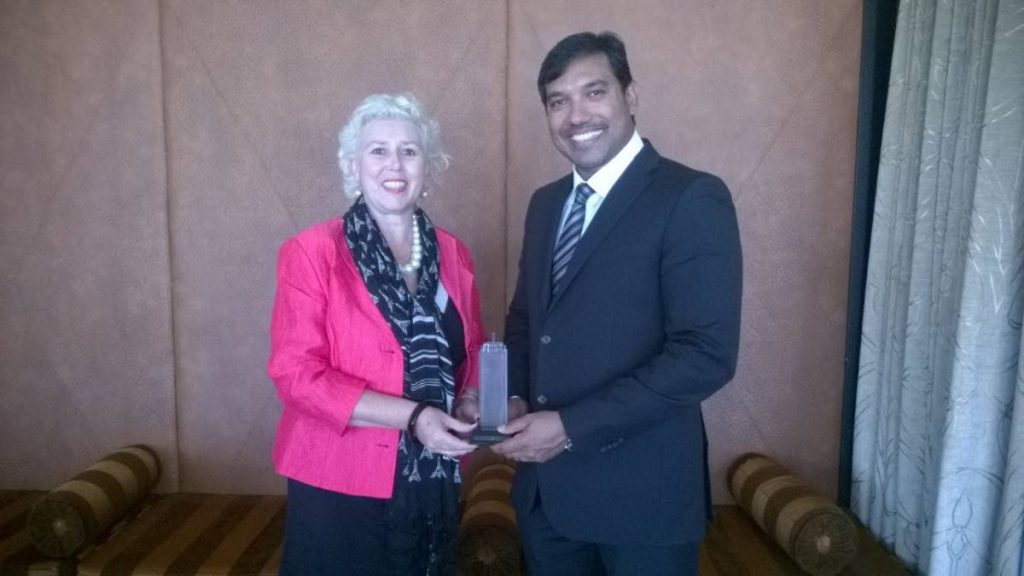No risk, no reward: Trinidad-born financial analyst on life in Dubai

The concept of risk management is something people abide by every day.
It can be applied to every aspect of life and business, from wearing a seatbelt while driving to recognising a good investment.
For Randall Mohammed taking chances has special significance not only because of his job as a risk manager, but also because he left his home in TT to further his career in new, unfamiliar territories.
Mohammed has almost 20 years' experience as a risk manager and financial analyst.
In this role, he is tasked with understanding the potential risks in companies' operations and formulating ways to reduce these risks.
His job has taken him from the boardrooms of Dubai in the United Arab Emirates (UAE) to the Congo River, experiences that shaped his understanding of business and life.
Sunday Newsday spoke with Mohammed, 52, on what these experiences mean to building a stronger more efficient country.
As a Pointe-a-Pierre native, the energy industry has been a part of Mohammed's life for as long as he can remember.
Born and raised in the shadow of the Texaco refinery where his father Rafeek Mohammed worked as an engineer, he joked that oil and gas was in his blood.
“I still have fond memories of working at Petrotrin’s marine engineering division and contract’s office, during summer vacations.
“Even today my dad and I have engaging discussions on the closure of the refinery.”
He attended St Peter's Private Primary School and Presentation College, San Fernando, and developed his passion for finance at Wilfrid Laurier University, Canada, where he majored in economics and business administration.
After graduating in 1992, Mohammed returned to TT where he got his first job at Risk Management Services Ltd, a Neal and Massy Group company, before transitioning to the Telecommunications Services of TT (TSTT) becoming one of the youngest managers at 26.
"Part of risk management is developing business continuity plans considering the impacts of hurricanes, adverse weather effects and IT risks.
“I recall being stationed at our emergency command centre during the Y2K event monitoring reports from our emergency reporting system. If there was an incident with the network in Australia or Asia for example, we would be notified and take corrective action.”
Risk assessment demands an almost clairvoyant ability to see the future, what could go wrong and being able to develop a contingency plan to counter this.

- PHOTO COURTESY RANDALL MOHAMMED
The objective is to keep business in business by protecting those revenue earning assets in the first instance and developing a plan to continue operations if those assets were damaged.
Mohammed's organisational skills were sharpened when he was appointed as part of a critical infrastructure task force for the First Summit of the Americas and the Commonwealth Heads of Government Meeting, both held in Port of Spain in 2009.
While he travelled to South Africa and Cape Verde for business, his chance to work abroad on a permanent basis came in 2011 when a friend based in Miami invited him to be part of a new venture in Dubai.
"A friend of mine was setting up a company in Dubai to run construction and energy projects in Africa.
"I was offered a position and I was appointed as the managing director of a start-up company, World Petroleum Partnership which was based in Dubai because of my background in risk management."
He said it was life-changing decision to move half a world away to a country he has only learned about through magazines.
“At that time I didn’t know anyone living in Dubai to consult with.
"After spending 17 years at TSTT, that took a lot of pondering, I really had to think about it carefully, so I made a sort of a test trip to Dubai with my wife and children and what I found was that it was a fantastic place.
"I felt comfortable in Dubai because of the similarity, it wasn't identical, but I felt comfortable with the people.
"For me it was a chance to personally develop myself to get out there in a different environment. That experience is priceless. I have absolutely no regrets in doing it and for me it was a bit of a career change as well, from telecoms to energy which is something that I always wanted to be part of ever since I was a child growing up near Texaco."
Mohammed said his children, Nicholas and Gabriella, adapted well to the new country making several friends and even learning Arabic.
“My kids were very young at the time so they had problems adjusting. They were able to interact with people from all corners of the globe. My son surprised me one day by speaking a few words in Russian.”
One of his first assignments was to devise an oil spill response service for Equatorial Guinea's National Oil Company, drawing on experiences he learned from TT Emergency Mutual Aid Scheme (TTEMAS), which was used to respond to emergencies in Pt Lisas.

PHOTO COURTESY RANDALL MOHAMMED - PHOTO COURTESY RANDALL MOHAMMED
Having taken the first step, Mohammed said he quickly learnt important lessons in leadership from his Emirati colleagues.
Remarking on their strong work ethic and sense of innovation, he said Emiratis were open to working and collaborating with foreign experts, something he hopes can catch on among TT's people and their leadership.
“What struck me was the ability of 200 nationalities to work and live side by side in perfect harmony.
"One of the things I realised was Dubai's ruler Sheikh Mohammed bin Rashid al Maktoum did not have the word 'can't' in his dictionary. It’s this 'can do' attitude that has built world class companies such as Dubai Energy and Water Authority, Emirates National Oil Company and Emirates Airlines.
"I think we as Trinidadians need to develop the same attitude, because of this, Dubai is a world class city, it's ranked as the most secure city in the world and they are a society that isn't afraid of foreign direct investment, in fact they encourage it.
"There's nothing wrong with expat labour, Dubai would not be Dubai if it did not rely on expertise from expats. I recall my past CEO at TSTT sending a team to Japan to learn total quality management. His rationale was learning from those that have been there and done that."
Even outside of Dubai, Mohammed says the lessons learned from his trips to African and Middle East countries like Saudi Arabia, Oman, Kenya, Angola and Mozambique have reinforced his views and the importance of family and unity.
“For me crossing the mighty Congo River from Brazzaville to Kinshasa was a surreal moment.”
“I used to look forward to my trips to Africa.
“In fact, I’m happy to have maintained my friendship with my African counterparts. Today, I’m working on a fuel storage project in Senegal."
Having done charity work through several African countries, Mohammed said these visits also put into perspective the importance of giving back to the less fortunate.
“I spent several years as chairman of the Prime Minister’s Charity Golf Classic, so helping others was nothing new.”
"I remember one guy, the driver in Congo, at the end of our stay, I was thanking him for his help, and he said, 'Boss my eyes give me so much trouble because of the glare.' I know he can't afford to buy a pair of shades, I gave him my sunglasses it was a simple gesture, but I know he appreciated it a lot.”
At the same time, he notes there have been frightening moments in travel.
“I also recall a Congolese officer pulling me into a small room just before boarding my flight. He asked how much money I had, reached into my wallet and took everything I had. I told myself, keep calm and said to myself he probably needs it more than me. I was just happy to catch my flight.”
Despite this, Mohammed said experiences in different countries opened his eyes to different cultures, and taught him how similar people are, noting the similarity of music in Equatorial Guinea to TT's calypso and soca.
Mohammed hoped TT would follow Dubai's example and make serious, organised efforts away from oil and gas and into new revenue earners.
“Today petroleum accounts for less than three per cent of their GDP.
“They used their petro dollars to develop an on oil economy based on tourism, retail, financial services, real estate, entertainment and import export. However it doesn’t happen overnight. It takes decades. The process begins by asking 'diversify from what, diversify to what, diversification to what end and diversification for whom.'”
According to Dubai's Khaleej Times, the UAE has focused on doubling its digital economy over the next ten years.
Citing recent tax concessions and resources allocated to digitisation from TT's 2022 budget, Mohammed said now is the perfect opportunity to follow through with a re-invigorated approach to technology and innovation.
"During the pandemic we saw how digitisation took over, in fact Amazon made the most money during the pandemic. Those who shifted to digitisation survived.
"Today data and data analytics is becoming more valuable than oil and gas molecules.”
But Mohammed said digitisation isn't the only avenue available to TT, noting that with the proper investment and policy, TT can reach new heights, but it all begins with recognising opportunity and taking a chance to capitalise.
"I think there's huge opportunity for real estate, I mean it's a tropical island who wouldn't want to come and live here? Our sand, sea and fauna isn’t something we shouldn’t take for granted.”
"Cuba does it where you have medical tourism and post-surgery recovery, if we develop our medical sector properly, we can have a potential niche there.
"Import and export can be easily done. We have two ports in TT, we need to optimise it even more, there's no reason why TT can't produce software. Why can't TT be the next silicon valley of the Caribbean there's a wealth of expertise coming out of the UWI and UTT we need to harness it. One would like to see an internet park, designed to attract IT companies. Similarly you could set up a cargo city in and around the airport and ports to attract logistics companies.”
Mohammed left Dubai last April during the covid19 lockdown as companies began to downsize and froze new hiring.
He now lives in Florida where he continues to work as a financial adviser for Northwestern Mutual.
He has used his knowledge in modular fuelling systems and holds the distributorship rights for a leading manufacturer of tanks and fuelling equipment.
"I’m presently introducing this new technology to the US, Caribbean and Latin America.
“I think there are good opportunities to develop community fuelling services with a cost effective, safe and environmentally friendly systems.”
Mohammed is also a frequent contributor to Gulf Intelligence’s international energy and finance podcast. His latest comments on the geopolitical consequences of higher oil prices were published by Turkish media house Anadolu Agency.
His son, now 19, is studying biomedical engineering at Florida International University while his daughter is in high school. “I hope one day they would return to Trinidad and contribute to its development."

Comments
"No risk, no reward: Trinidad-born financial analyst on life in Dubai"